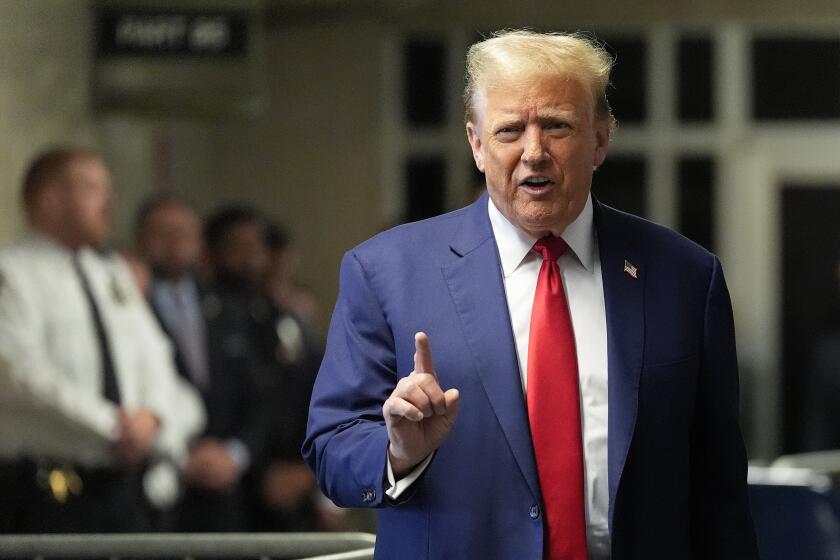Age-Old Nationalist Hero Gets a Demotion in China
BEIJING -- “Give us back our territory!”
From statues and temples across China, the furious brush strokes of Gen. Yue Fei command the nomadic invaders who occupied northern China in the 12th century to retreat.
Since his battles during the Song Dynasty, Yue has been one of this nation’s most revered historical figures, his status cemented by an official cult built by subsequent Chinese regimes.
The ruling Communist Party, it would seem, could hardly have picked a more potent symbol of nationalism to bolster its own fragile legitimacy.
“Over time, Yue Fei has become not just a symbol of Chinese culture -- he has become Chinese culture,” said Leo K. Shin, a historian at the University of British Columbia who is writing a book on Yue.
But nationalism cuts both ways, and Beijing occasionally has to tamp it down to keep it from tripping up government policies.
Yue’s bloody campaign against northern peoples -- who are now, in fact, Chinese citizens -- doesn’t exactly fit with current officials’ desire to promote harmony among the nation’s 55 officially recognized minority ethnic groups.
So Chinese authorities have decided: Enshrining Yue as a national hero is no longer politically correct.
But China’s deeply rooted folkloric traditions are not easily discarded.
Negating Yue’s status as a national hero “implies denying that wars between nations and peoples occurred in China’s history. Isn’t that absurd?” complained Zhai Ruofu in a letter to the Southern Metropolitan Daily newspaper.
Chinese children around the globe learn about how the young patriot Yue, born in 1103, knelt as his mother tattooed the characters for “Repay your country with utmost loyalty” on his back.
Yue led the Song armies against the invading Jurchen tribes of Manchuria. He was on the verge of triumph when Prime Minister Qin Gui, who considered the war too costly, had him recalled to the capital, imprisoned and executed on trumped-up charges in 1142.
Qin has been despised ever since as a national traitor. He is figuratively boiled in oil and eaten every morning across China in the form of a breakfast dough strip that bears his name.
The current debate started last month when front-page media reports revealed that the Education Ministry had issued secondary school curricula instructing that Yue was no longer to be considered a national hero.
Also stripped of hero status was Song Prime Minister Wen Tianxiang, who was captured and executed by invading Mongols.
The government’s logic was that centuries of wars against nomads of the Central Asian steppes were little more than “domestic squabbles” among China’s own ethnic groups. The status of national heroes, it asserted, should be reserved for those who fought real foreigners, such as the Dutch or Japanese.
Outraged citizens posted Education Ministry phone numbers on Internet bulletin boards so that others could register their dismay.
At the time that Yue fought, the Jurchen tribes were indeed considered foreigners. The Jurchen established their own dynasty, the Jin, in northern China, while the Song ruled the south.
Before China’s current borders were drawn, the Chinese controlled parts of Central Asia, Manchuria, Mongolia and Tibet. They did not, however, consider those areas as belonging to China, which was traditionally equated with the Han majority.
Now, however, many of these regions are part of Chinese territory, and their inhabitants are considered members of China’s “big family” of ethnicities.
“The premise of the Education Ministry is flawed because it is ahistorical,” said Shin, the historian. “In the Song Dynasty, the idea that China was a unitary, multinational state would not make any sense.”
The ministry has now issued a statement that the remarks were not in any curriculum but were instead scholarly opinions included in supplementary reference materials for secondary-school history teachers. Playing down the controversy, the statement admitted that “throughout Chinese history, Yue Fei and Wen Tianxiang have always been considered national heroes.”
But this is no longer what students are taught in school.
“When we take tests, we have a multiple-choice question: Which persons are national heroes?” Beijing high school student Xin Ming told China Newsweek magazine last month. “If you pick Yue Fei, you get it wrong.” Textbooks now refer to Yue simply as a “general who resisted the Jin” Dynasty.
On one level, the decision reflects Beijing’s strategic priorities. China was traditionally preoccupied with the threat of invasion from the north and west by nomadic peoples, whom the Great Wall was built to keep out. But with the arrival of Western powers in the mid-19th century, China’s vigilance shifted to its coastal borders.
Then again, traditional Chinese views of ethnic minorities could, by modern standards, be considered flagrantly racist.
China long considered itself the “central kingdom” (“Middle Kingdom” is a mistranslation) from which civilization radiated toward the culturally inferior barbarians on its periphery.
In his most famous poem, memorized by schoolchildren for centuries, Yue rants about eating the flesh and drinking the blood of his ethnic enemies.
Of the many complaints on the Internet about the ministry’s decision, none appear to have been made by ethnic minorities.
More to Read
Start your day right
Sign up for Essential California for news, features and recommendations from the L.A. Times and beyond in your inbox six days a week.
You may occasionally receive promotional content from the Los Angeles Times.






